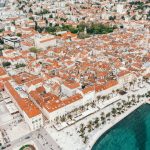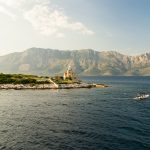When you think about continental Croatian cities, with perhaps the logical exception of Zagreb, you tend to think of the lack of job opportunities and the locals making their way abroad. However, that isn’t always the case, and some have come from as far away as Sri Lanka to try their luck in no less than the beautiful continental Croatian region of Zagorje.
As Poslovni Dnevnik/Ana Blaskovic writes on the 3rd of February, 2020, Croatian citizens have been off seeking their luck and happiness in other European Union countries, and now Michelle and her compatriots will be able to do the same, because after five years in Croatia, they can go and seek employment in the EU.
Somewhere halfway “in the pocket” between the two motorways, Zagorje to Macelj and Varazdin to Gorican, below the northern slopes of Ivancica, lies the picturesque continental Croatian town of Ivanec.
Although its population doesn’t even stretch to 15,000, the area is known for its low unemployment, an export-oriented manufacturing industry and more. Among the companies that have reached outside of EU borders for access to a foreign (third country) workforce is the Ivancica footwear factory whose brand of children’s shoes, Froddo, is known to parents in 40 countries around the world, not only here in Croatia.
While they have successfully adapted to the traffic ”handicap” with good delivery planning, they still say that “time is money”, and the burning problem of a shortage of workers has proven to be a major obstacle for them. Therefore, last summer, the continental Croatian town ”cast its net” far and wide in its search for foreign workers. That proverbial net stretched all the way to the Indian subcontinent, miles away from Croatia’s more classic regional pool which is mostly relied on by domestic companies. In mid-December, 18 Sri Lankan workers arrived in the continental Croatian town of Ivanec.
Ten men and eight women from tropical Sri Lanka arrived during the fall of the very the first snow in Zagorje, which was seen for the first time in their lives, as Sri Lanka is only 780 kilometres away from the Equator, much like the distance from Zagreb to Berlin.) They came with the help of Astra Centre, a subsidiary of the US company Aster International, which brings Croatian companies staff from abroad, primarily from countries like Honduras, Sri Lanka, Vietnam and the Philippines.
Unlike some other stories of foreign workers who see the promised land in Croatia, the Sri Lankans did not have to borrow money from obscure loan companies to get here. The rules of the Astra Centre are extremely strict: once a worker meets the requirements and goes through the elimination process, the employer must pay for their travel and their insurance, and the mediator makes sure that the worker is hired according to all of the proper regulations. Under Croatian law, a foreign worker must have the same rights and obligations as a Croatian worker.
Michelle Ashniya Rodrigo Warnakulasooriya is 25 years old, she worked in a hospital as an administrator back in Sri Lanka, and spent her spare time sewing with her mother. After the Easter bombings last year, in which 259 people were killed and 500 injured in the capital, Colombo, she decided to apply for a job in Croatia. “I’m very happy with the job, the other workers are very nice, they help us a lot and we like it here,” she says.
She adds with a laugh that “it’s just a little bit cold.”
“We knew what the weather was like here. Before our arrival, we did a lot of research on Croatia. We love the snow, we like change,” she says on behalf of her fellow countrymen. She is an informal spokeswoman because not everyone speaks English. Her native language is Sinhala, which is spoken by most islanders, and a third of them can speak Tamil. Although Sri Lanka is a former British colony of Ceylon, after gaining its independence in 1948, English was abolished as an official language, which of course causes issues for those seeking better lives abroad.
For those who do not speak English, any attempts at conversations tend to look a bit like something out of a pantomime, and there is always the Google translate app, which, while not perfect, gets the message across generally. She is slowly learning Croatian, having mastered ”How are you?” (Kako ste/si), ”Thanks” (Hvala), ”Molim” (Please) and ”igla” (needle), which is needed for her work.
Make sure to follow our dedicated lifestyle page for more.








